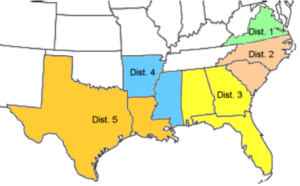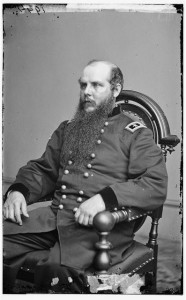Pursuant to the first Reconstruction Act enacted in early March 1867, President Andrew Johnson was required to appoint a district commander for each of the five military districts that divided up the South. On March 11th the president appointed Generals Schofield, Sickles, Thomas, Ord, and Sheridan. General Thomas, the Rock of Chickamauga, begged off and was replaced by General John Pope to command the Third District – Georgia, Alabama, and Florida. A northern editorial lauded the appointments. From The New-York Times March 15, 1867:
The New District Commanders.
Probably no fitter choice of military commandants for the five Southern Districts was easily possible, than that which the President has just made. The five soldiers named – THOMAS, SHERIDAN, SCHOFIELD, ORD and SICKLES – have a national and healthy fame. They are not noisy, impracticable theorists, but men of fair judgment, resolute, not alarmed by rumors or moved by threats. They became distinguished not entirely by displaying genius in the field, but by their force of character and executive ability, They possess the confidence of Gen. GRANT. The promptness with which their nominations were acted upon by the President and Cabinet, and their speedy assignment to duty, forms a happy augury that the Military Law of Congress will be carried out in good faith and to the letter by all branches of the Government.
[relief that the commanders chosen don’t distrust “the expediency of putting the South under military control” and are mostly in charge of the same areas where they already were working.]
The key-note to the execution of the law is already struck by Gen. SCHOFIELD in Virginia. In assuming command of the First District, with headquarters at Richmond, that officer notifies all civil authorities under the Provisional State Government to continue in their duties till he may otherwise order. In this way he wisely avoids that peril of anarchy which was feared by some statesmen as the inevitable issue of the bill. He proposes to exercise military power “only so far as necessary to accomplish the objects for which it was conferred.” Other commanders will take the same ground – save, perhaps, in exceptional quarters like Texas, or at some unusual epoch like that of a turbulent election. In this way the desired revolution in the feeling of Southern society will be accomplished, and none the less effectually for being smooth and noiseless.
According to the March 19, 1867 issue of The New-York Times (middle column) one of General Schofield’s first acts as commander of the First District (the Old Dominion) was to proclaim that he would enforce two provisions of the 1867 Army Appropriations Act. All militias in the South were to be disbanded and not called into service again unless authorized by Congress. Furthermore:
Sec. 5. And be it further enacted, That it shall be the duty of the officers of the army and navy and of the Freedmen’s Bureau to prohibit and prevent whipping or maiming of the person, as a punishment for any crime, misdemeanor, or offence, by any pretended civil or military authority, in any State lately in rebellion, until
the civil government in such State shall have been restored, and shall have been recognized by the Congress of the United States.
The Times editorial seems relieved that the prompt appointment of the commanders might indicate that President Johnson wasn’t going to impede the purpose of the Reconstruction Act. Hans L. Trefousse wrote that the president wanted to use the appointments to make some political hay: “Too shrewd a politician not to take advantage of the fact that Grant, the most popular officer in the country, was not very well liked by some of the radicals, he consulted the general and largely accepted Grant’s recommendations.” Secretary of the Navy Gideon Welles was “appalled” that President Johnson appointed some radical generals, but the president “wanted to please Grant,” … “As time would show, he could always dismiss them later on.”[1]
Jengod’s map of the military districts is licensed by Creative Commons From the Library of Congress: the seven generals from Harper’s Weekly on April 6, 1867; Maj. Gen. John M. Schofield
- [1]Trefousse, Hans L. Andrew Johnson: A Biography. New York: W.W. Norton & company, Inc., 1997. Print. page 281.↩


![The new military commanders in the [in]surrectionary states ( Illus. in: Harper's weekly, v. 11, no. 536 (1867 April 6), pp. 216-217; LOC: https://www.loc.gov/item/00652830/)](https://www.bluegrayreview.com/wp-content/uploads/2017/03/3c27611v-300x242.jpg)
